Choosing the best website builder for your small business can be a nightmare.
If you’re rolling in dough, you can have a professional do it for you. But chances are you don’t want to spend (or even have) the money for that major investment.
And you definitely don’t want to waste precious time on a useless website builder and have to backtrack when you have a billion other tasks to do.
That’s why you need to choose the best website builder from the get-go.
But how do you know which one’s best for your specific needs without trying them?
We’ve got you covered — in this no-fluff guide, we dissected the 15 best options out there into pros, cons, pricing, and more.
Jump in to find your best match!

The 15 Best Website Builders of 2023: Pros, Cons, Pricing, & More
With so many website builders to choose from, we’ve saved you the effort of trawling through long reviews and surfing hundreds of websites.
Below, we explore the 15 best website builders out there.
1. Wix
With over 517,000 websites running on it, Wix is THE most popular website builder in the world.
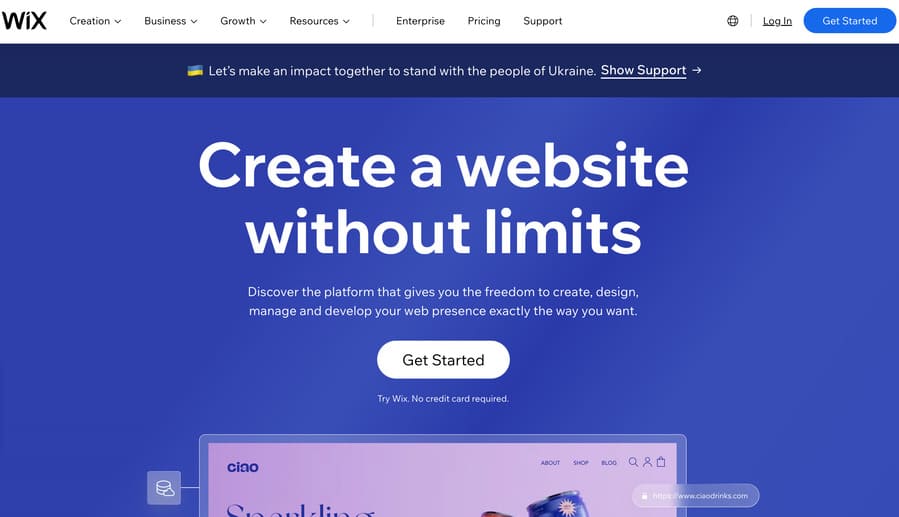
It’s a cloud-based website builder that lets users easily create professional websites without any coding knowledge.
Who Should Use This Builder?
Small businesses, entrepreneurs, freelancers, bloggers, and anyone who wants to create a website without coding or web-design knowledge.
Plans & Pricing
Starting at just $16, Wix offers a range of good value options for website plans, plus eCommerce store options for small businesses.
| Website Plans | Price | Business & eCommerce Plans | Price |
| Combo | $16/mo | Business Basic | $27/mo |
| Unlimited | $22/mo | Business Unlimited | $32/mo |
| Pro | $27/mo | Business VIP | $59/mo |
| VIP | $45/mo |
Pros
- A drag & drop editor
- Hundreds of customizable templates
- Free web host services and a custom domain name
- SEO (Search Engine Optimization) friendly
- 24/7 customer support
Cons
- Limited customization options
- Low access to HTML (HyperText Markup Language) and CSS (Cascading Style Sheets)
- Limited storage space
- Limited bandwidth
- Can’t transfer website to another host
2. GoDaddy
The GoDaddy website builder is the largest services platform for entrepreneurs around the globe, with 20+ million users.
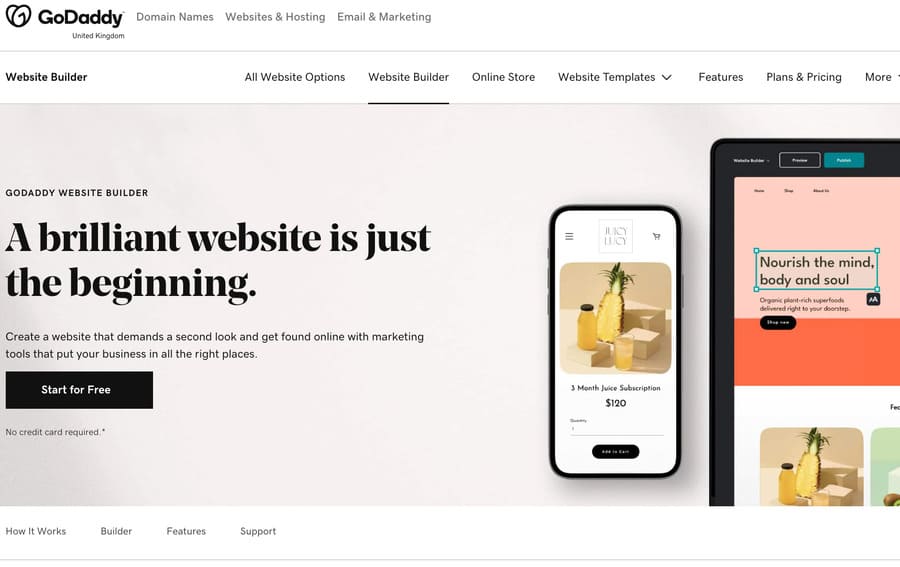
They offer a fully-hosted service and an easy-to-use website builder that doesn’t require technical skills.
Who Should Use This Builder?
Small, independent businesses or shops that need a clean and professional-looking website.
Plans & Pricing
GoDaddy’s cheapest plan starts at $9.99/month, but for businesses, the $16.99/month Commerce plan is better. It unlocks up to 5,000 product listings, real-time shipping rates, and shoppable social posts.
| Plans | Price |
| Basic | $9.99/mo |
| Premium | $14.99/mo |
| Commerce | $16.99/mo |
| Commerce Plus | $29.99/mo |
Pros
- Easy to use
- Affordable
- You can have a website in minutes with ADI (Artificial Design Intelligence)
- Lots of customizable templates
- You can start for free on any plan
Cons
- Plain site design
- Relying on ADI means your site isn’t unique
3. Squarespace
Squarespace (not to be confused with Square Online) is a sleek, minimalistic website builder ideal for those with aesthetic sensibilities.
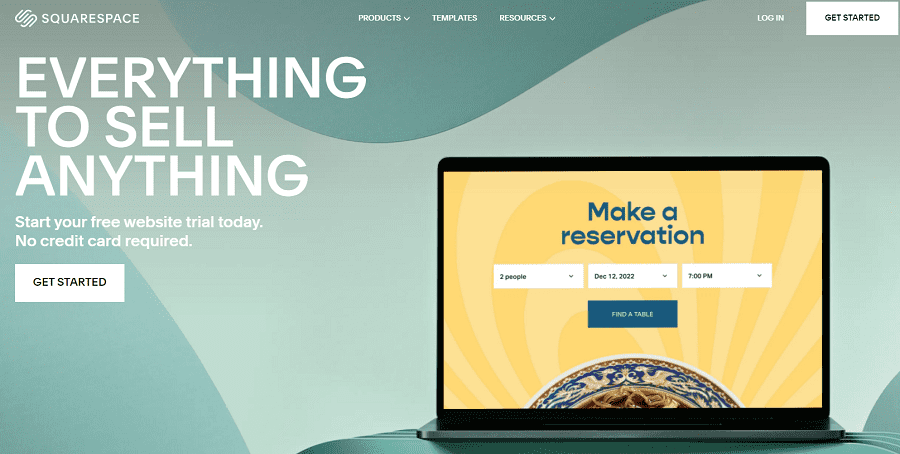
It strikes a good balance between ease-of-use for beginners and more advanced features for professional website builders.
The eCommerce store options are well worth looking at.
Who Should Use This Builder?
Art, video, music, and portfolio websites looking for a minimalist style, and anyone scaling their business or setting up an online store.
Plans & Pricing
You can build a beautiful site for just $11/month, but if you want to take payments or include a store, you’ll need to pay more.
| Plans | Price |
| Personal | $11/mo |
| Business | $17/mo |
| Commerce Basic | $24/mo |
| Commerce Advanced | $36/mo |
Pros
- 140+ templates
- Highly customizable
- Clean and beautiful designs
- Unlimited storage on all plans
- Advanced eCommerce platform
- Quality customer support
- Social media integration
- Seamless connection to Google Workspace
Cons
- Stores require a more expensive plan
- Time-consuming eCommerce platform setup
4. Shopify
Shopify is one of the most popular eCommerce platforms used by millions of businesses and major brands, including Tesla, Red Bull, and Nestlé.
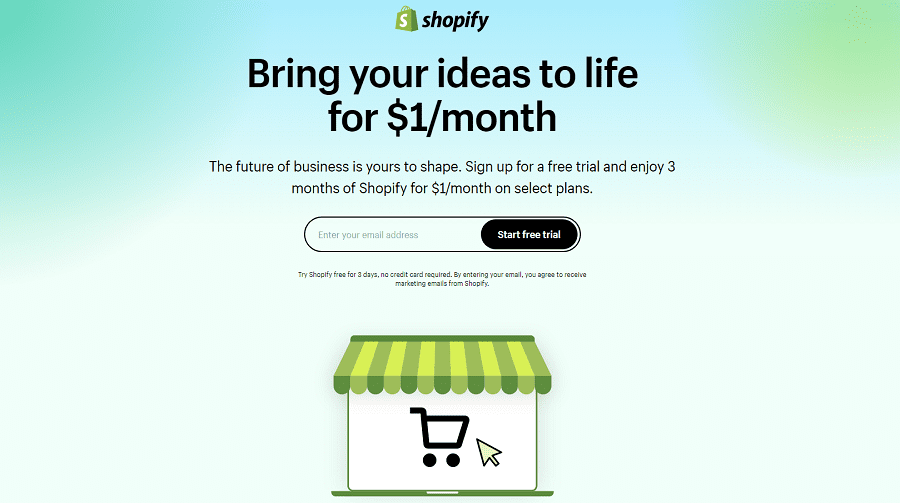
Few can beat Shopify when it comes to online stores.
It’s scalable and provides several payment options, including credit cards, PayPal, and Apple Pay.
Who Should Use This Builder?
Ecommerce and online stores with many products.
Plans & Pricing
Shopify isn’t cheap, but you get a lot for your money. There are three main Shopify pricing plans to choose from:
| Plans | Price |
| Basic Shopify | $29/mo |
| Shopify | $798/mo |
| Advanced Shopify | $299/mo |
Pros
- Tons of beautiful themes
- Free 256-bit SSL (Secure Sockets Layer) certificate
- Dropshipping integrations
- SEO support
- Automated store emails for email marketing campaigns
- Optional social media plugins
- Google Workspace connectivity
Cons
- Expensive
- No free plan with eCommerce
- Limited blogging features
5. Weebly
Weebly is an easy-to-use website builder with top-notch SEO and marketing integrations. It offers users simple website design with useful eCommerce website solutions.
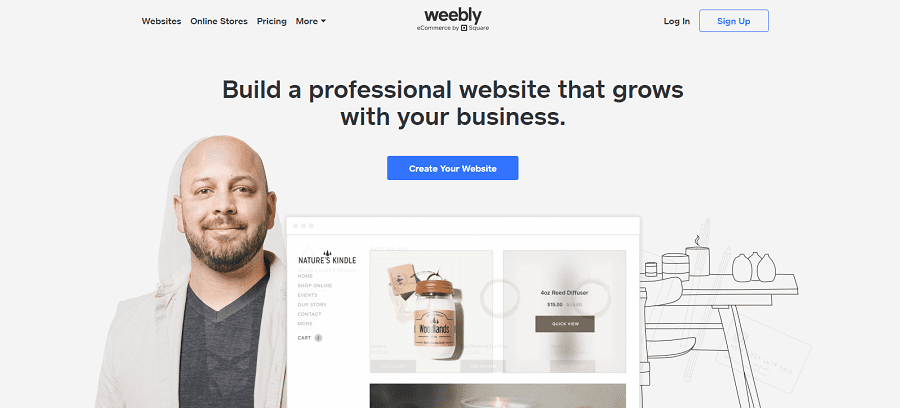
Weebly is Powered by Square, who’s behind the point-of-sales system. Thanks to this, it’s super easy to integrate a point-of-sales system for payment processing.
Who Should Use This Builder?
Small businesses who want to create an online store.
Plans & Pricing
Starting at $0/month up to $30/month, Weebly’s price plan is very reasonable.
| Website Plans | Price |
| Free | $0/mo |
| Personal | $10/mo |
| Professional | $12/mo |
| Performance | $26/mo |
Pros
- Easy-to-use building blocks
- Email marketing capabilities
- Free Plan includes 500 MB storage & marketing tools
- Can change the website template without reloading content
- Accepts payments via Square, Paypal, and Stripe
- Allows advanced users to make changes in the Code Editor
Cons
- Editor doesn’t allow you to move things freely
- SEO needs improvement
- Shows Square ads on your site on both Free and Personal plans
6. WordPress
Wordpress.org is a free, open source platform used by a shocking 43.1% of all websites. Later, Wordpress.com came as the creators’ way to monetize their platform.
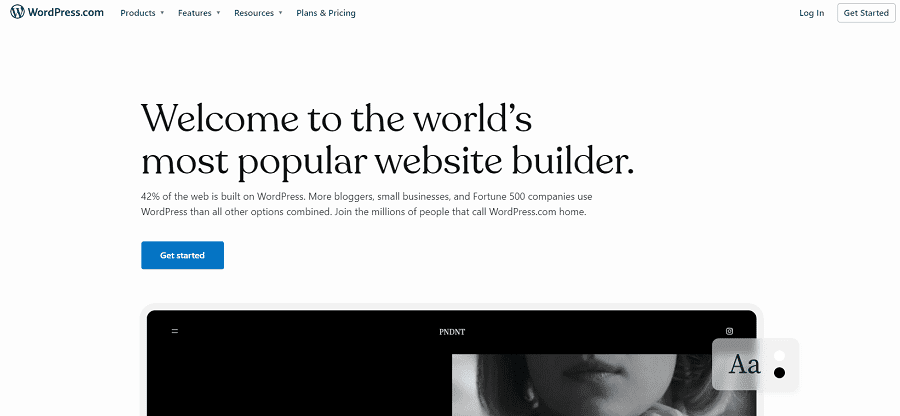
WordPress.com includes WordPress hosting services and makes it easier to start your site, while WordPress.org requires web hosting elsewhere.
Who Should Use This Builder?
Anyone who wants complete control of website design and plug-ins. It’s best for bloggers, complex sites, or those looking to scale.
Plans & Pricing
Wordpress.com has a free plan available. However, its paid plans offer more features and start at only $4 per month for a Personal Plan and $8 per month for a Premium Plan.
| Plans | Price |
| Free | $0/mo |
| Personal | $4/mo |
| Premium | $8/mo |
| Business | $25/mo |
| eCommerce | $45/mo |
Pros
- Completely customizable
- A drag & drop editor
- Many templates, plugins, and page builders
- Scalable
- Good SEO plugins like Yoast
- Additional plugins for email marketing and social media
- An open source system
- Google Analytics integration
Cons
- Time-consuming
- Requires some knowledge and practice
- Can’t install plugins or code on the free plan
- Too many options for beginners
7. HostGator
The HostGator site builder is run on Hostgator, one of the largest web hosting services in the world.
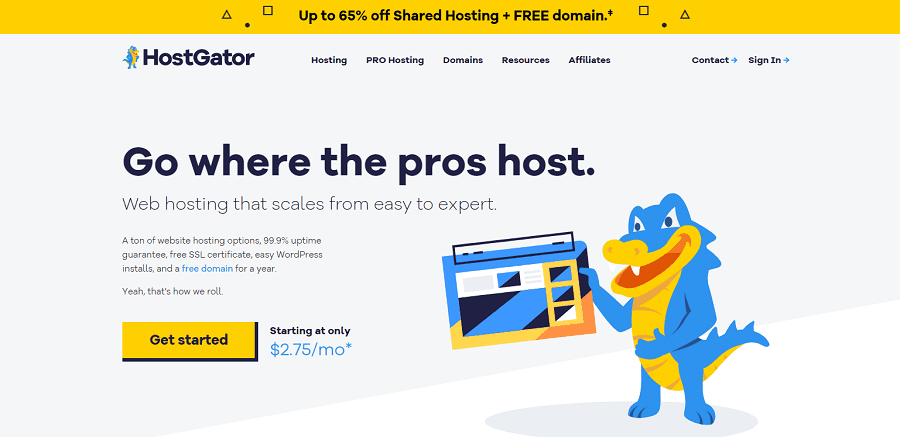
It’s a fully integrated, easy-to-use solution with all the necessary functions, so you don’t have to worry about the technical aspects.
Who Should Use This Builder?
Bloggers and businesses, especially those on a budget!
Plans & Pricing
The Gator website builder has some enticing introductory offers, with prices starting at less than $3/month for up to 36 months. Below is a full breakdown:
| Plans | Introductory Offer | Renewal Price |
| Hatchling Plan | $2.75/mo | $7.99/mo |
| Baby Plan | $3.50/mo | $12.99/mo |
| Business Plan | $5.25/mo | $16.99/mo |
Pros
- Scalable
- Fantastic value with lots included in their basic plan
- Easy integrations
- Several website template options
Cons
- No free plan or trial
- Monthly payment are more expensive than yearly payments
- Aggressive upselling – be careful with unchecking extra features
8. Duda
Duda is a great collaborative site builder that allows multiple users and teams to work together.
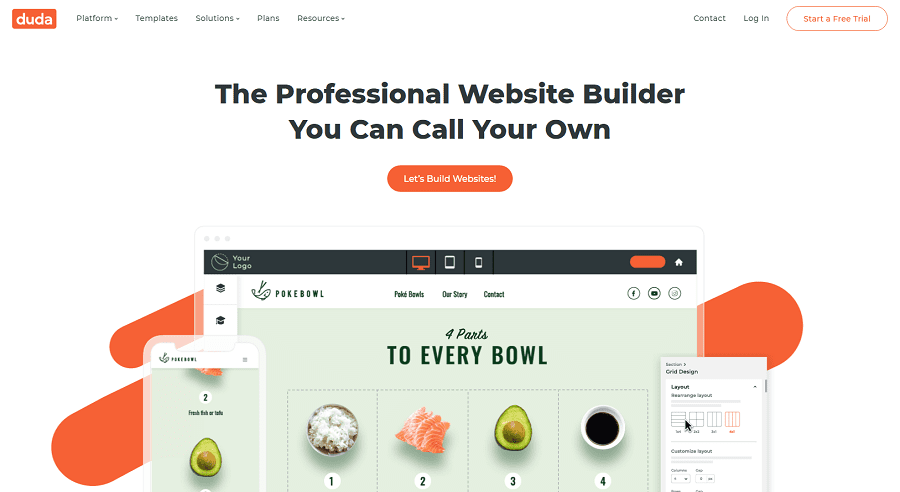
Its snazzy features minimize the time it takes to go live, with 80% of online stores launching in under a day.
Who Should Use This Builder?
Large companies, web-development agencies, and large multilingual sites.
Plans & Pricing
Duda’s pricing is somewhere in the middle, with an option for a 14-day free trial and plans ranging from $14 to $74.
All plans can be turned into stores with optional eCommerce website add-ons.
| Plans | Price | eCommerce Add-ons | Price |
| Basic | $14/mo | Standard | $7.99/mo |
| Team | $22/mo | Advanced | $19.25/mo |
| Agency | $44/mo | Unlimited | $39/mo |
| White Label | $74/mo |
Pros
- 55 different languages
- Guaranteed 99.99% uptime
- Includes client management tools and advanced features
- Can use the same design for multiple pages to produce websites faster
- A drag & drop editor
Cons
- No custom domain option
- No email addresses
9. Web.com
One of the oldest website builders around, Web.com has a wealth of experience and outstanding customer support.
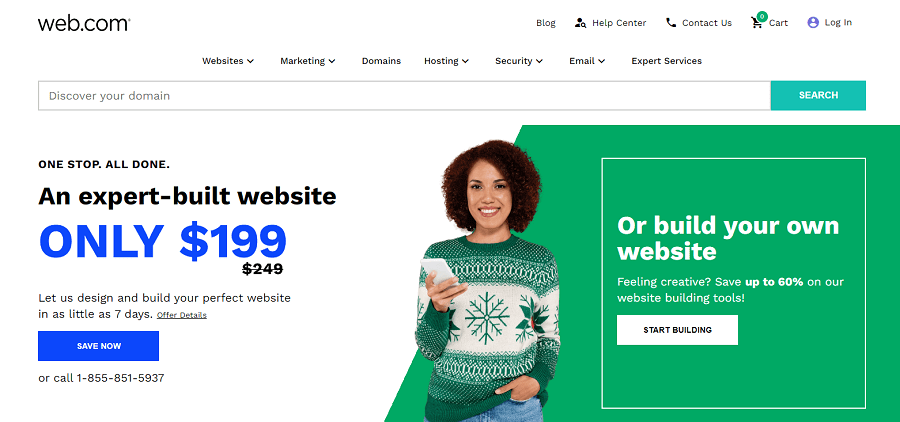
The site is easy to use and offers an expert website creation service. However, keep in mind their eCommerce options are limited.
Who Should Use This Builder?
Personal sites and small businesses.
Plans & Pricing
Web.com offers reasonable prices and all the great features you would expect. However, they don’t offer a free plan or trial.
| Plans | Introductory Offer | Renewal Price |
| Website Essentials | $4.95/mo | $9.99/mo |
| Business Essentials | $7.96/mo | $19.99/mo |
| eCommerce Essentials | $13.96/mo | $24.99/mo |
| eCommerce Premium | $19.96/mo | $39.99/mo |
Pros
- Appointment scheduling with reminders included in Business and upwards
- Includes 1-year free domain
- 100s of templates
- The eCommerce Premium plan includes unlimited products
Cons
- More expensive than other options, particularly for eCommerce
- Can’t transfer to a different platform
- Limited blogging functionality
10. IONOS
If you have your content written and images ready, putting a site together with IONOS takes only a few minutes, thanks to its fast and intuitive functionality.
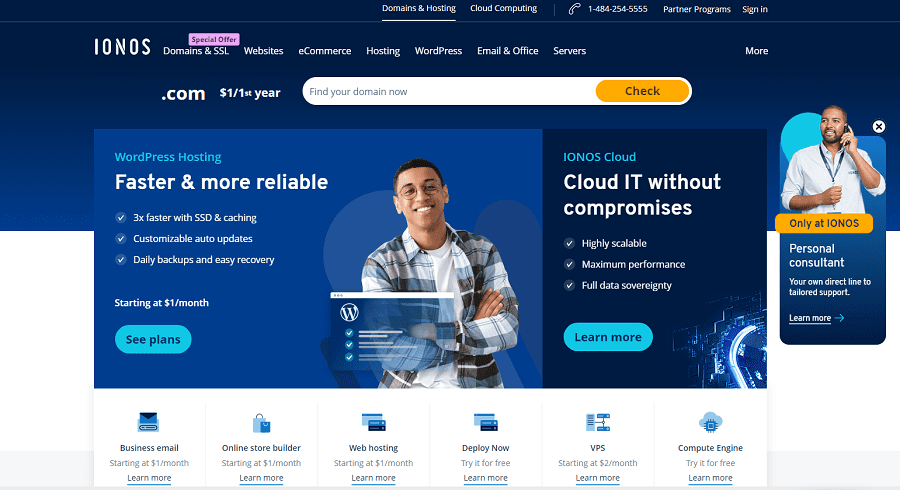
However, it offers limited design capabilities and isn’t as flexible or scalable as other website builders on this list.
Who Should Use This Builder?
Solopreneurs, entrepreneurs, and small business owners.
Plans & Pricing
With no free plan, their cheapest option is the mid-range Plus plan, available for $1.
All plans can be upgraded to include a store.
| Plans | Introductory Offer | Renewal Price | Introductory Offer With Store | Renewal Price With Store |
| Starter | $5/mo | $9/mo | $5/mo | $19/mo |
| Plus | $1/mo | $15/mo | $1/mo | $25/mo |
| Pro | $15/mo | $25/mo | $25/mo | $50/mo |
Pros
- Can add custom HTML
- Good looking templates
- Includes professional email in all plans
- Relatively cheap to set up a webstore
- Multilingual website
Cons
- No free plan
- App integrations require an eCommerce plan
- Fewer templates on the simple plan
- Few available fonts
- Simple eCommerce options compared to Shopify
11. Bigcommerce
As the name implies, Bigcommerce focuses on eCommerce and conversion rates.
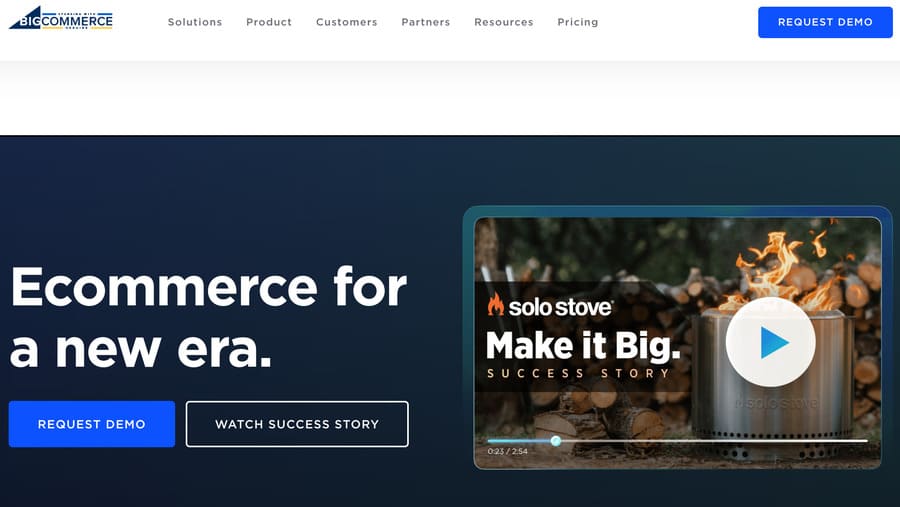
It’s a fully hosted, readily scalable solution that offers more advanced features than other website builders, making it perfect for scaling businesses.
Who Should Use This Builder?
Retail, fashion, marketing, and advertising websites.
Plans & Pricing
Bigcommerce isn’t the cheapest starting point for an online store, with their basic plan starting at $29.95/month.
However, it offers a range of functionalities only rivaled by Shopify. It also offers a free 15-day trial.
| Plans | Price |
| Standard | $29.95/mo |
| Plus | $71.95/mo |
| Pro | $269.95/mo |
| Enterprise | Custom |
Pros
- No transaction fees for third-party payment gateways
- Can sell in different currencies
- Integrates with many marketplace platforms
- Offers comprehensive features in its basic plan
- Integrates with popular payment methods
- 24/7 customer support
Cons
- The standard price plan doesn’t include abandoned cart functionality
- Limited design and editing capabilities
- Comparatively expensive
12. Zyro
Recently acquired by Hostinger, Zyro is a state-of-the-art web builder that uses the power of AI to create your site in minutes.
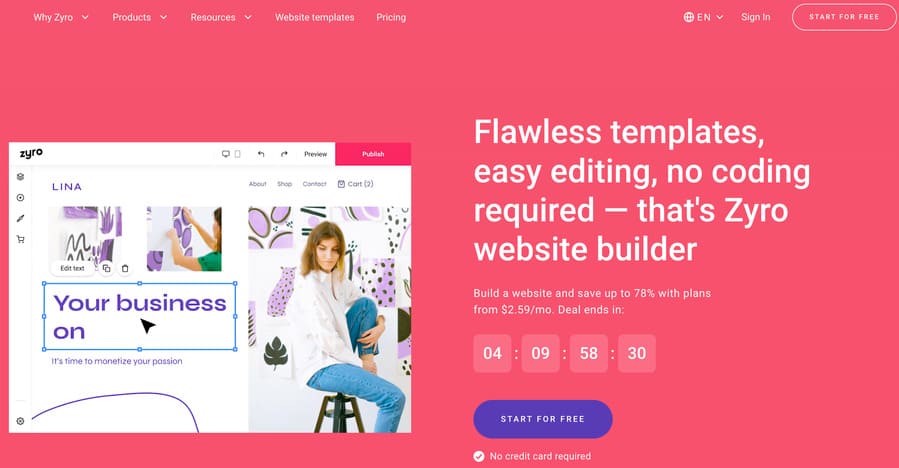
It also has webshop options to host up to 500 products.
Who Should Use This Builder?
According to Hostinger chief product officer Giedrius Zakaitis, the site caters to “beginners looking for a quick and easy solution to build a website or online store.”
Plans & Pricing
Zyro plans are simple, but beware, the prices on their website are for their 2-year plan, which is the cheapest option.
| Plans | Introductory Offer | Renewal Price |
| Website | $2.59/mo | $11.99/mo |
| Business | $3.59/mo | $14.99/mo |
Pros
- Good value for money
- Easy for beginners
- A drag & drop editor plus AI tools
- Organized grid system
- Multiple SEO-optimized templates
Cons
- No free plan
- A limited number of products
- Locked – can’t customize freely
13. Hostinger
Hostinger is an all-in-one solution with hosting and website builder options.
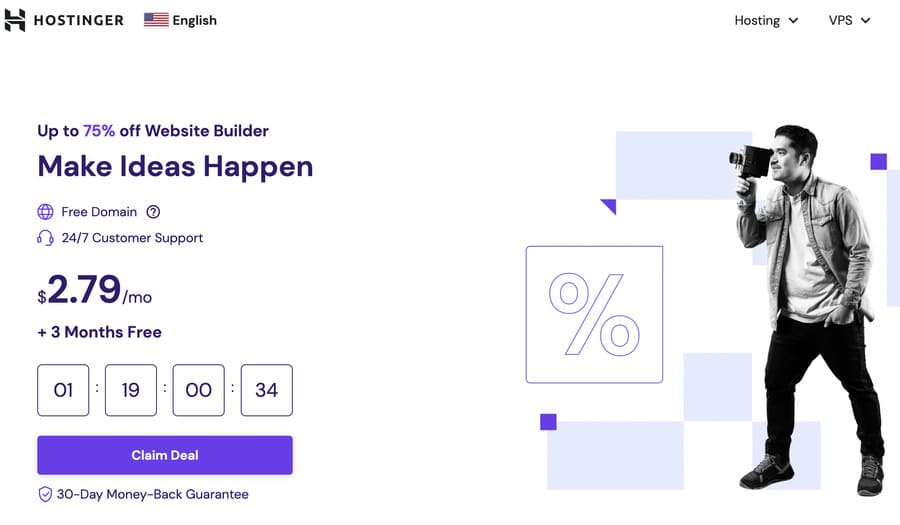
Hostinger’s own site builder will replace Zyro, or rather, Zyro’s development will now continue as Hostinger’s new website builder.
Who Should Use This Builder?
Beginning website developers looking for an easy-to-use system with AI generator capabilities.
Plans & Pricing
Since the website builder comes as a freebie when you purchase web host services, the pricing is complicated as it depends on the type of host capabilities you want.
Here are the 2–year prices:
| Hosting Type | Introductory Offer | Renewal Price |
| Shared | $1.99-$3.99/mo | $3.99-$8.99/mo |
| WordPress | $1.99-$11.59/mo | $3.99-$19.99/mo |
| Cloud | $9.99-$29.99/mo | $19.99-$54.99/mo |
| VPS | $3.99-$77.99/mo | $6.99-$131.99/mo |
Pros
- A drag & drop editor
- Built-in marketing integrations with SEO tools plus its own SEO tool
- AI content generator, logo-maker, and business-name generator
- In-house developed eCommerce platform
Cons
- Low uptime guarantee compared to competitors
- No advanced functionality for experienced users
14. Strikingly
Strikingly is a very simple website maker designed to create single-page or small websites with ease.
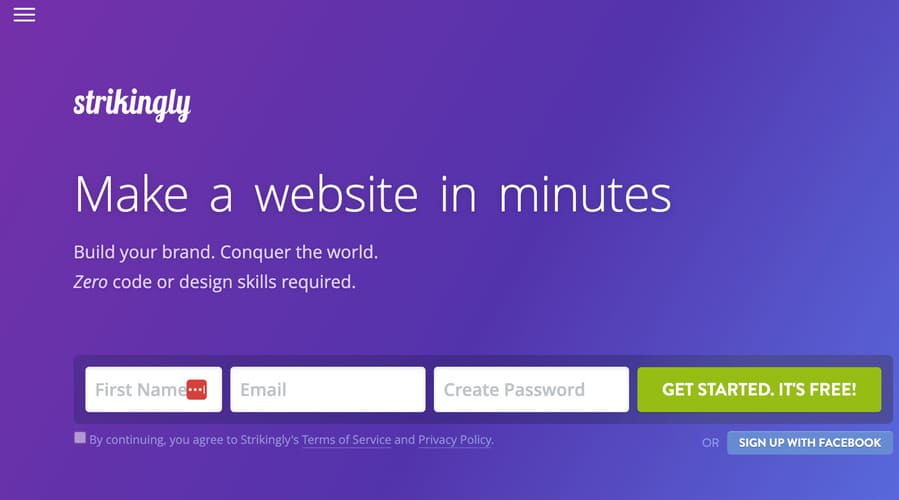
They prioritize mobile viewing, and their free and paid plans include enough features to be worth a try for interested website creators.
Who Should Use This Builder?
Total beginners and anyone who wants to create one-page websites.
Plans & Pricing
Strikingly keeps a simple price plan to match their style, with only three options. The longer you bind yourself, the cheaper it gets.
| Plans | Introductory Offer |
| Limited | $8/mo |
| Pro | $16/mo |
| VIP | $49/mo |
Pros
- VIP plan includes webshop with unlimited products
- Free plan with unlimited free sites – up to 5 pages each
- Can add custom email for a small yearly fee
- Supports popular apps like Pinterest and PayPal
Cons
- No SEO tool extensions – hard to rank
- Free plan doesn’t include SSL certificate and has a Strikingly subdomain
- Slow site speed
15. Jimdo
Jimdo is an amazing AI website builder that can get your website built in less than 5 minutes.
And it actually looks good!
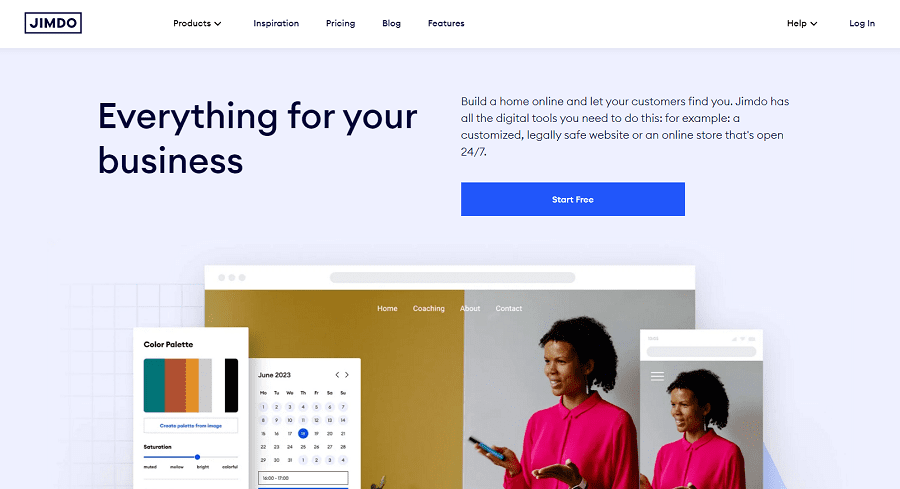
While you sacrifice flexibility and creativity, this is the builder for you if you’re stuck for time and on a strict budget.
Who Should Use This Builder?
Simple websites like portfolios and small online stores.
Plans & Pricing
Jimdo’s price plan is very reasonable, and it’s great for anyone who needs access to a free website builder. Plan options range from $0/month to $14/month.
| Plans | Introductory Offer |
| Play | $0/mo |
| Start | $9/mo |
| Grow | $14/mo |
Pros
- Offers a free plan
- AI website builder makes it extremely efficient
- Includes a free logo-builder
- You can add interactive content with their SmartApps feature
Cons
- Free plan isn’t indexed
- No blogging or marketing tools
- The payment gateway choice is limited.
- Support is limited to email and is not 24/7
Do you want access to even more great website builders? Consider exploring this other Smart Blogger guide.
So Tell Me, Which is The Best Website Builder?

So, which is the best website builder for your needs?
With so many choices, the key is knowing what features you can’t live without and starting the elimination process from there.
Think long-term — where do you want your website to be in 3-5 years?
After that, it’s a question of which website builder offers the features you need at the best price.
Ultimately the best website builder is the one that will carry your business into the future.
The post 14+ Best Website Builders for Small Businesses in 2023 appeared first on Smart Blogger.

No comments:
Post a Comment